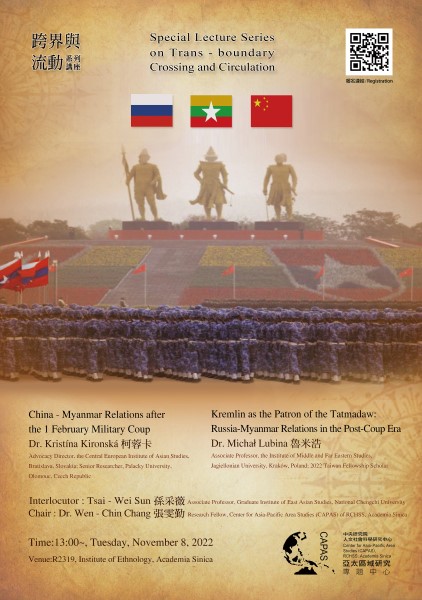【演講1摘要 About the Talk】
Following Myanmar’s 1 February military coup, Beijing has remained more cautious than other countries in its response. Protesters accused China of supporting the Myanmar generals, torching Chinese factories, and boycotting Chinese products in response. Was China, however, actually, backing the Tatmadaw (Myanmar military)? It would be too simplistic to assume that China favors a return to military rule in Myanmar. Myanmar, with its many Belt and Road Initiative (BRI) projects, is important for China to achieve its strategic presence in the Indian Ocean and choosing the appropriate strategy is therefore crucial for a continued relationship. Beijing’s initial ambiguous attitude towards the coup did not favor the Tatmadaw, and despite a reasonable relationship with Aung San Suu Kyi did not favor the protest movement either. As time passed, however, China edged increasingly closer to recognizing the military regime, approving funds for infrastructure projects, and donating COVID-19 vaccines. Why did such a shift occur? Although initially logical and beneficial, appearing neutral would become more costly to China’s strategic interests as time goes on.
【講者1簡介 About the Speaker】
Kristína Kironská is a socially engaged interdisciplinary academic with experience in Myanmar affairs, Taiwan affairs, Central and Eastern Europe-China relations, campaigns, and activism. In 2015-2016, she lived in Myanmar, where she worked for a local non-governmental organization and conducted research on the 2015 elections, the political transition of the country, and the issue of the Rohingya. In 2017-2018, she worked for Amnesty International as a campaigner (currently the Board Director). In 2019-2020, she lived in Taipei where she conducted research under the Taiwan Fellowship program, lectured at the University of Taipei, and organized monthly human rights talks. Currently, she is the Advocacy Director at the Central European Institute of Asian Studies (www.ceias.eu) and a Senior Researcher at the Palacky University in Olomouc. She can be reached at kristina.kironska@upol.cz.
【演講2摘要 About the Talk】
Until Myanmar’s 1st February 2021 military coup Russia-Myanmar relations remained good yet limited. Both sides cooperated in arms sales, making it the backbone of their relationship, in military training and supported one another diplomatically; they also held talks in nuclear cooperation. The breakthrough came with the military coup, politically supported by Russia. Since then Moscow became Tatmadaw’s second most important global partner (after China) and Russia-Myanmar ties only intensified after Russia’s full scale invasion of Ukraine on 24th February 2022. Since then a new patron-client relationship is emerging: thanks to engaging with the Tatmadaw, Russia sells arms, secures a political beachhead in Southeast Asia and limits its own isolation; as for the Tatmadaw, it gets arms, partially decreases its global isolation and limits its reliance on China. In a way, it is a contemporary Burmese version of two-headed bird strategy employed in precolonial Southeast Asia. For both sides, it is a mutually convenient asymmetric relationship of two isolated countries.
【講者2簡介 About the Speaker】
Michał Lubina is Associate Professor of Political Science at Jagiellonian University, Kraków, Poland. In his research he mostly focuses on contemporary Myanmar and on Russia-China relations. He is the author of nine books (three in English), including ‘A Political Biography of Aung San Suu Kyi’ (Routledge: London-New York 2020), ‘Russia and China. A Political Marriage of Convenience’ (Budrich: Leverkusen-Berlin-Toronto 2017) and ‘The Moral Democracy. The Political Thought of Aung San Suu Kyi’ (Scholar: Warsaw 2018; also translated into Burmese and published in Myanmar in 2020) as well as over 100 articles on Asian issues. In 2016-2017 he served as the first Director of Korean Sejong Institute in Krakow. In 2018 he was a Visiting Professor at Chulalongkorn University in Bangkok. Currently he is MoFA Taiwan Fellow 2022. He can be reach at: michal.lubina@uj.edu.pl.
備註Note
主辦單位保留更改活動及審查報名資格權利,兩次以上無故缺席者,將取消報名資格。
送出報名表單並不代表成功錄取,錄取通知信將於報名截止後以email寄出。
為因應COVID-19疫情,此活動將依防疫規定限制參與人數,如後續改為全線上會議將另行通知,請務必預先報名。
為落實防疫工作,實體會議將於入口處測量體溫、與會者禁止飲食、全程配戴口罩、保持社交距離,並填寫訪客記錄表。


